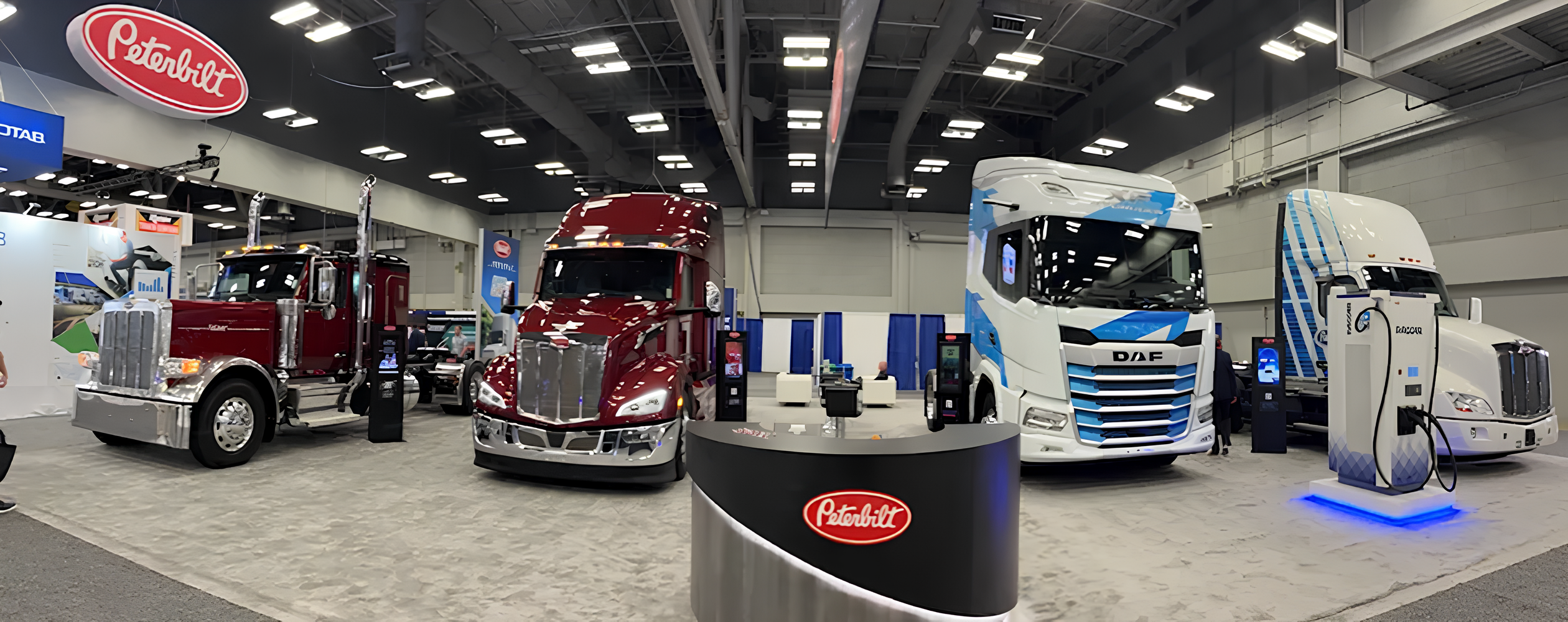Peterbilt Hydrogen Engine: A Sustainable Revolution in Trucking
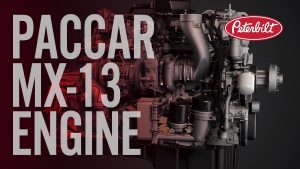
Revolutionizing Trucking: Peterbilt’s Hydrogen Engine Debuts with a Bang
At the recent American Trucking Associations annual management conference in Austin, Texas, the Peterbilt hydrogen engine made a significant impact. This prototype, a DAF XF Euro-style high cab-over truck equipped with a modified Paccar MX-13 engine, represents a major leap in sustainable trucking. For more insights on events and news from the American Trucking Associations, check out this page.
Technical Insights into the Peterbilt Hydrogen Engine
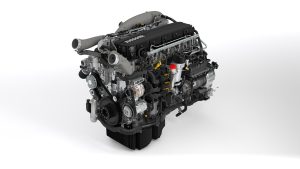
295 Horsepower of Innovation: The Power Behind Peterbilt’s modified PACCAR MX-13 Hydrogen Engine
The Peterbilt hydrogen engine, producing 295 horsepower, is a testament to Peterbilt’s commitment to innovation. Jacob White, director of product marketing, emphasized that modifications to the pistons, heads, and fuel system were essential to adapt to hydrogen fuel, with a focus on maintaining efficiency and power. Explore additional advancements and models in the DAF lineup, follow this link.
Emission Challenges of the Peterbilt Hydrogen Engine: Tackling NOx Concerns
“While the Peterbilt hydrogen engine is a step towards zero emissions, it does produce a small amount of nitrogen oxide (NOx). The U.S. Environmental Protection Agency currently recognizes it as zero emissions, but the stance of the California Air Resources Board remains to be seen.”
For a deeper understanding of environmental challenges in trucking, explore this page.
Enjoying our insights?
Subscribe to our newsletter to keep up with the latest industry trends and developments.
Stay InformedAdapting the Engine for Hydrogen Use
Adapting the engine for hydrogen required significant changes, including a different compression ratio and a lower pressure system compared to diesel engines. These modifications are crucial for the engine’s performance and efficiency.
Hydrogen Storage Solutions: A Key Feature of the Peterbilt Hydrogen Engine
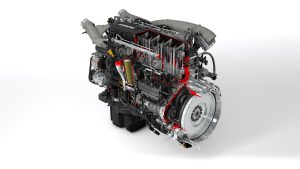
Tackling Emissions Head-On: Peterbilt’s Stride Towards Zero Emissions
The hydrogen storage system, comprising four 90-liter tanks, is similar to compressed natural gas (CNG) systems but operates under slightly higher pressure. This design choice reflects Peterbilt’s approach to practical and efficient fuel storage.
Advantages of the Peterbilt Hydrogen Combustion Engines
Hydrogen engines, like the Peterbilt hydrogen engine, offer several benefits, including lower acquisition costs and fuel expenses compared to fuel-cell electric vehicles (FCEVs). Additionally, extending the range is as simple as adding more fuel tanks, making it a flexible solution for long-haul trucking. Dive deeper into the world of fuel cells and their applications in trucking, visit this link.
Overcoming Obstacles: Energy Density and Infrastructure for the Peterbilt Hydrogen Engine
The lower energy density of hydrogen means more fuel is needed to match the range of diesel trucks. Moreover, the lack of a widespread hydrogen fueling infrastructure, especially in the U.S., poses a significant challenge for widespread adoption.
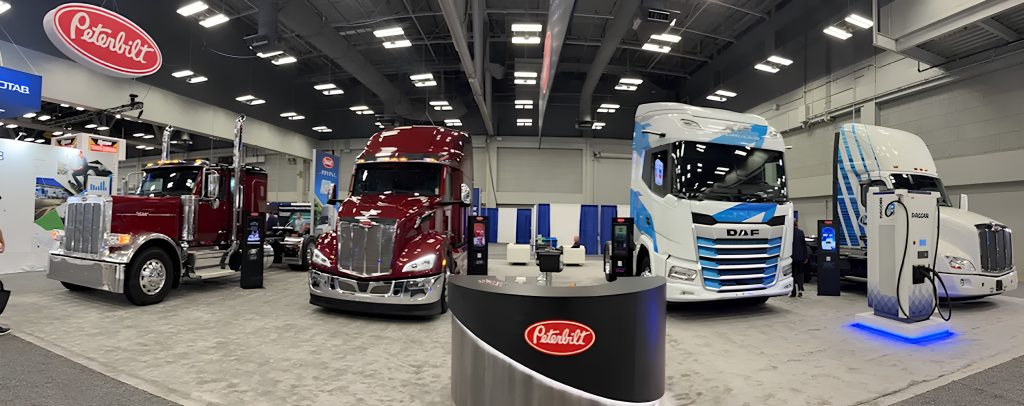
Engineering for the Future: Adapting Traditional Engines for Hydrogen
The Economic and Environmental Impact of the Peterbilt Hydrogen-Powered Trucks
Cost-Benefit Analysis: Acquisition and Operation of the Peterbilt Hydrogen Engine
The Peterbilt hydrogen engine offers a cost-effective alternative to traditional diesel engines and FCEVs. Its simpler design and operation could lead to significant savings for trucking companies. To learn more about fuel efficiency trends in heavy-duty trucks, click here.
Fuel Efficiency and Range Considerations for the Peterbilt Hydrogen Engine
While hydrogen’s lower energy density is a concern, advancements in fuel efficiency and storage could mitigate this issue, making hydrogen a viable option for long-range trucking.
Hydrogen vs. Diesel: A Comparative Study by Peterbilt
Comparing hydrogen to diesel, the former offers a cleaner, more sustainable option, though it currently falls short in terms of energy density and fueling infrastructure. Stay updated on the latest trends and news about Peterbilt, check out this link. For more news on Paccar and their innovations, explore this page.
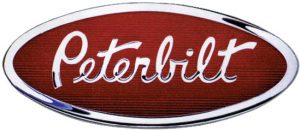
Hydrogen vs. Diesel: Peterbilt Leads the Charge in Sustainable Trucking
Building the Hydrogen Fueling Network for Peterbilt Trucks
Developing a robust hydrogen fueling network is critical for the success of hydrogen-powered trucks. Europe currently leads in this area, but the U.S. is gradually catching up. Understand the strategies being employed in the trucking industry for sustainability, visit this link. For insights into the push towards zero emissions in trucking, follow this link.
Charting the Future with Peterbilt’s Hydrogen Engine
Recognition and Awards: The 2022 Truck Innovation Award for the Peterbilt Hydrogen Engine
The hydrogen engine’s potential was recognized with the 2022 Truck Innovation Award, highlighting its significance in the industry. This was the first U.S. outing for the truck, nearly two years after receiving the award.
Path to Production: Next Steps for the Peterbilt Hydrogen Engine
While still in the prototype stage, Peterbilt is actively working towards a production version, indicating a strong future for hydrogen in trucking. Jacob White noted,
“The real purpose of this is to show it’s possible. There’s a lot of conversation around electric vehicles, but we need longer range.”
There’s still a lot of work to do before a production version, he added, but “it’s definitely on the product road map.”
Electric vs. Hydrogen: Balancing Technologies in Peterbilt’s Vision
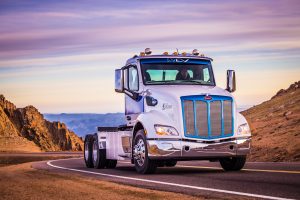
Charting a Sustainable Path: Peterbilt’s Commitment to Cleaner Trucking
Peterbilt’s exploration of both electric and hydrogen technologies shows a commitment to diverse, sustainable solutions in trucking.
Peterbilt’s Vision for a Sustainable Future with the Hydrogen Engine
Peterbilt’s foray into hydrogen power is part of a broader vision for a sustainable, efficient future in trucking, demonstrating the company’s dedication to innovation and environmental responsibility.
Exploring the Milestones: Peterbilt’s Hydrogen Engine Progress
As we conclude our examination of the Peterbilt hydrogen engine, it’s important to objectively review the key milestones that have defined its development. These developments not only highlight the technological strides made by Peterbilt but also provide insight into the evolving landscape of sustainable trucking.
- Initial Showcase at ATA Conference: The introduction of the hydrogen-fueled prototype at the American Trucking Associations conference marked a notable entry of Peterbilt into the arena of hydrogen-powered heavy-duty trucks.
- Adaptation of the Paccar MX-13 Engine: The modification of the Paccar MX-13 engine to use hydrogen fuel represents a significant engineering endeavor, reflecting the industry’s ongoing efforts to adapt to alternative energy sources.
- Emissions and Environmental Considerations: The minimal NOx emissions produced by the Peterbilt hydrogen engine highlight the complexities and challenges in achieving zero-emission trucking, amidst evolving regulatory and environmental standards.
- Developments in Hydrogen Storage and Infrastructure: The progress in hydrogen storage solutions and the gradual build-up of a hydrogen fueling network are critical factors in determining the feasibility and adoption rate of hydrogen-powered trucks.
- Industry Recognition: The receipt of the 2022 Truck Innovation Award signifies industry recognition of Peterbilt’s contributions to advancing trucking technology.
- Collaborative Efforts in Technology Development: Partnerships, such as the collaboration with Toyota in hydrogen fuel cell technology, underscore the role of joint ventures in technological innovation within the trucking industry.
- Commercialization and Future Prospects: The ongoing plans for commercializing hydrogen-powered trucks indicate a continued focus on this technology, suggesting a potential shift in the industry towards more sustainable energy solutions.
These milestones, while showcasing Peterbilt’s role in the development of hydrogen-powered trucks, also reflect a broader industry trend towards embracing cleaner and more efficient energy sources. As the trucking industry continues to evolve, the Peterbilt hydrogen engine represents one of many steps towards a more sustainable future in transportation.
Explore More on Related Topics
Delve deeper into the various facets of trucking technology and industry trends:
- Heavy-Duty Trucks: Discover more about the backbone of the freight industry and the latest models, explore this link.
- Innovation in Trucking: Stay abreast of cutting-edge technologies and innovative solutions shaping the future of trucking, visit this page.
- Long-Haul Trucking: Understand the challenges and advancements in long-haul trucking, follow this link.
- Semi Truck Engines: Explore the heart of the trucking industry with insights into semi-truck engine technology, check out this link.
- Trucking Industry News: Stay updated on the latest trends and news affecting the trucking industry, explore this page.
- Trucking Technology: Dive into the technological advancements driving efficiency and safety in trucking, visit this link.
Explore External Resources and Insights
- American Trucking Associations (ATA): Gain insights into the organization shaping the trucking industry. American Trucking Associations
- DAF Trucks N.V.: Discover more about DAF’s range of trucks and their commitment to innovation. DAF Trucks N.V.
- PACCAR Inc: Learn about the global technology leader in the design and manufacture of premium trucks. PACCAR Inc
- Peterbilt Motors Company: Explore the history, vehicles, and technological advancements of Peterbilt. Peterbilt Motors Company
- Hydrogen Fuel Cell Technology: Explore the science and application of hydrogen fuel cells in transportation. U.S. Department of Energy – Fuel Cell Technologies Office
- Hydrogen Infrastructure Development: Understand the current state and future prospects of hydrogen fueling infrastructure. Hydrogen Fuel News

